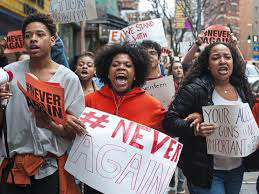(Reuters) – In the week since 17 of David Hogg’s classmates and teachers were gunned down in Florida, he and his fellow high schoolers have launched a movement that reshaped the gun control debate almost overnight and may influence the US midterm elections.
Staring boldly into TV cameras, Hogg and other students who survived the Feb. 14 Parkland school massacre, have demanded lawmakers restrict gun sales and are targeting politicians funded by the pro-gun National Rifle Association (NRA) lobby.
They have taken to social media to urge peers to hold a National School Walkout on March 14 and converge on Washington 10 days later for the “March For Our Lives.”
Plunging into a debate that has long polarized the United States between those defending gun ownership as a constitutional right and those demanding measures to stop mass shootings, the students are now focusing on the November elections.
“We get out there and make sure everybody knows how much money their politician took from the NRA,” Hogg said.
They want to influence not only those casting their first ballot this year, but all voters, to make choices along gun-rights lines.
The students seem to have made more progress in a few days than years of anti-gun advocacy that has stumbled on opposition from congressional Republicans who fiercely defend their constitutional rights to own guns.
The students’ movement is forcing donors to cut funding to the NRA and pressuring lawmakers to stop taking money from the politically influential gun rights group.
The teenage activists themselves are collecting millions of dollars from celebrities such as Oprah Winfrey and George Clooney, enjoy pro-bono advertising from people in Hollywood and organizational know-how from groups including the Women’s March.
What may be different about the Parkland students is their almost instantaneous mobilization and the power of social media, where their passionate speeches have gone viral, experts said.
“It’s this perfect storm of young people whose authority to speak cannot be denied because their friends were just murdered, have control of social media, the ability to speak to mass media, have celebrity support and organizational infrastructure,” said Sasha Costanza-Chock, an associate professor of civic media at MIT.
Democrats have rushed to support the teenagers, hoping the movement can help them in the midterm elections by boosting historically-low turnout among young Democratic voters.

